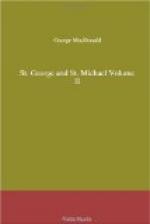At the first thunderclap lady Margaret fell on her knees and prayed in an agony for the little soul that had gone forth into the midst of the storm. Like many women she had a horror of lightning and thunder, and it never came into her mind that she who had so loved to see the horse spout was far more likely to be revelling in the elemental tumult, with all the added ecstasy of newborn freedom and health, than to be trembling like her mortal mother below.
Dorothy was not afraid, but she was heavy and weary; the thunder seemed to stun her and the lightning to take the power of motion from the shut eyelids through which it shone. She lay without moving, and at length fell fast asleep.
To the marquis alone of the mourners the storm came as a relief to his overcharged spirit. He had again opened his New Testament, and tried to read; but if the truths which alone can comfort are not at such a time present to the spirit, the words that embody them will seldom be of much avail. When the thunder burst he closed the book and went to the window, flung it wide, and looked out into the court. Like a tide from the plains of innocent heaven through the sultry passionate air of the world, came the coolness to his brow and heart. Oxygen, ozone, nitrogen, water, carbonic acid, is it? Doubtless—and other things, perhaps, which chemistry cannot detect. Nevertheless, give its parts what names you will, its whole is yet the wind of the living God to the bodies of men, his spirit to their spirits, his breath to their hearts. When I learn that there is no primal intent—only chance—in the unspeakable joy that it gives, I shall cease to believe in poetry, in music, in woman, in God. Nay, I must have already ceased to believe in God ere I could believe that the wind that bloweth where it listeth is free because God hath forgotten it, and that it bears from him no message to me.
CHAPTER XXII.
The cataract.
In the midst of a great psalm, on the geyser column of which his spirit was borne heavenward, young Delaware all of a sudden found the keys dumb beneath his helpless fingers: the bellows was empty, the singing thing dead. He called aloud, and his voice echoed through the empty chapel, but no living response came back. Tom Fool had grown weary and forsaken him. Disappointed and baffled, he rose and left the chapel, not immediately from the organ loft, by a door and a few upward steps through the wall to the minstrels’ gallery, as he had entered, but by the south door into the court, his readiest way to reach the rooms he occupied with his father, near the marquis’s study. Hardly another door in either court was ever made fast except this one, which, merely in self-administered flattery of his own consequence, the conceited sacristan who assumed charge of the key, always locked at night. But there was no reason why Delaware should pay any respect to this, or hesitate to remove the bar securing one-half of the door, without which the lock retained no hold.




